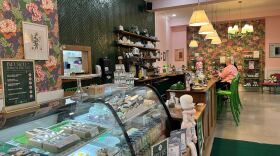In the past year, antibacterial wipes and hand sanitizer have become staples in our lives as people continue their cleaning regimens in public and private spaces.
Konstantin Sobolev, professor of civil and environmental engineering at UWM, was looking around at gym patrons early in the pandemic and marveling at the cleaning procedures. He realized that his research might be of service in making our lives a little safer.
Since then, Sobolev and a team of researchers have been working to develop a coating with a self-cleaning mechanism that would both prevent the virus from attaching to surfaces, and if particles do happen to attach, the coating would destroy them.
The coating combines years of research into superhydrophobic substances with photocatalysis, the use of light to decompose pathogens, in a two-pronged defense against potentially infectious particles. The first line of defense is a protective shield, modeled after the hydrophobic properties of lotus plants, “which repels any droplets and contaminated agents,” says Sobolev.
If the first line of defense fails, he says, “we have photocatalytic action … and decomposition of any pathogens which are still attached to the surfaces.”
This combination of superhydrophobic and photocatalytic properties is new, and this coating would be the first of its kind.
So, what surfaces can the spray be used on?
Pretty much anywhere you would apply paint, Sobolev explains. “We cover a decent portion of what is available in terms of touchable surfaces,” he says, including natural stone, glass, metals, ceramics, concrete, and potentially even paper or wood.
Sobolev envisions widespread applications for the spray. “Public transport, especially any public places, sports facilities, places where application is highly needed, but still may not be heavily regulated at the moment," he says.
Preliminary research results have been promising, and the next step is to bring the product to market — an ongoing process which has involved collaboration with UWM’s Lubar Entrepreneurship Center.
In spite of success with vaccination, Sobolev believes, “we still need to change the maybe modus operandi we used in the past for this infection. We are going to live in a new reality.”
Disinfection will be a part of our lives, he says, and this coating is “just trying to make our lives easier and … use less cleaning and disinfection and allow surfaces to do this job by themselves. Be smart.”






